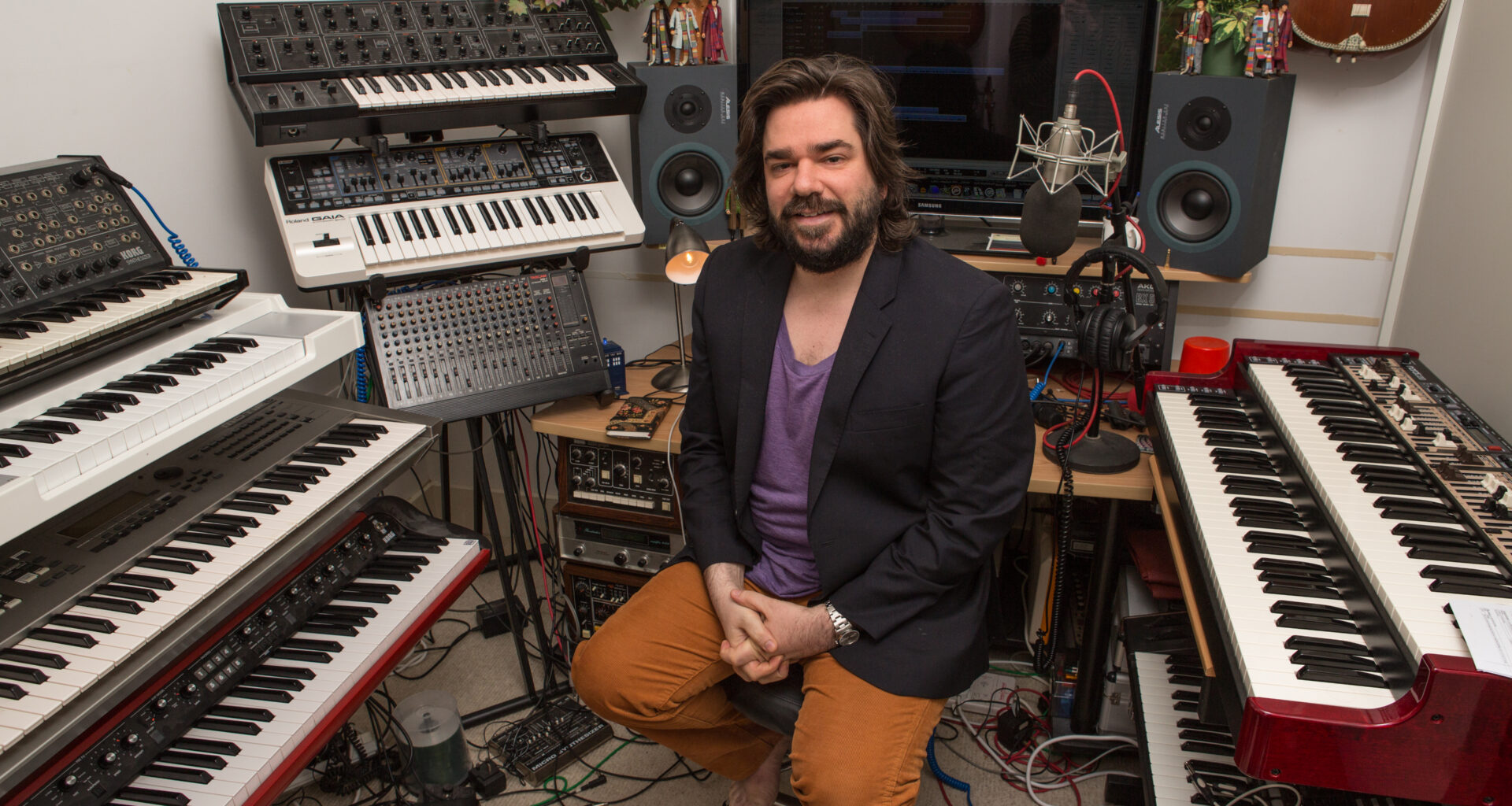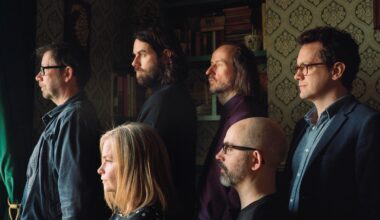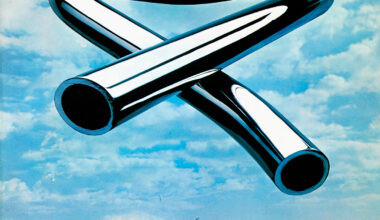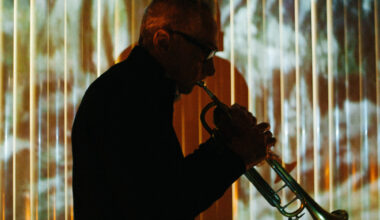TV themes from our formative years are as much a part of our lives as the pop we cherish. With a new album of theme tune covers, Matt Berry is doing more than looking back, he’s preserving them for future generations
If Matt Berry had a theme tune, it would be a wild jazz cacophony, a tumbling free fall of harps and violins to represent the many strings to the bow of an impressive career. He’s best loved for his comedy characters, from Dixon Bainbridge to Douglas Reynholm, from Beef in ‘House Of Fools’ to Bubbles the dolphin in ‘The SpongeBob Movie’, but it’s his clutch of releases on Acid Jazz Records and the Planet Jarre podcast he makes with his hero Jean-Michel Jarre that has our full attention.
“The idea of doing a covers album didn’t interest me,” says Berry of his latest musical project. “I’m not fond of a load of second-rate versions of songs. But then the idea of a TV themes album came up, which gave me a concept.”
More expansive than a cartoon dolphin, Berry’s new outing takes on the entirety of TV history. Well, some of it at least. ‘Television Themes’ is a collection of title music from 70s and 80s TV shows such as ‘Blankety Blank’, ‘Doctor Who’ and ‘Top Of The Pops’. He even includes the eight-note Thames Television ident that preceded family favourites like ‘Rainbow’, which is also featured on the album.
Although much of this will invoke memories of sitting around the tellybox watching Margo being snooty in ‘The Good Life’, it’s more than a sepia-tinged throwback. It actually sounds like a Matt Berry album, with all the pastoral prog folk showcased on his best record, 2011’s ‘Witchazel’.
“I’m not really into nostalgia,” he says. “It’s about the fun of recreating these things.”
Some of the tracks were the result of Berry sitting alone in his studio, with the likes of ‘Doctor Who’ and ‘Picture Box’ pretty much realising themselves (“Anything with mostly organ or keyboards was simpler, so I could get my head round it and finish faster”). Others needed more work, especially the 15-second themes, which had to be expanded into full songs. It was a task that required his band, The Maypoles, taking to his newly-fitted studio.
Berry and his touring outfit already had the Ronnie Hazlehurst classics ‘Are You Being Served?’ and ‘Sorry!’ under their live belts. They’d become live firm favourites because they were so peculiar. The first because it featured a cash register sound before Pink Floyd took the idea the new heights on ‘Money’ and the second because, well, it was just so strange.
“The original ‘Are You Being Served?’ doesn’t have a rhythm section,” says Berry. “It has a bass and a till loop, but there’s no drummer, which is interesting. That’s what made it stand out. The original was very sparse and the choice of instruments was quite odd, so I’ve added a heavier rhythm section just to give it a different feel. On ‘Sorry!’, there’s a bunch of things that shouldn’t work together. People thought of The Police as western-sounding reggae, but this takes that a stage further, where it’s almost posh reggae. It doesn’t make any sense. You certainly wouldn’t put that music with a Ronnie Corbett sitcom.”
Another oddity is the ‘Rainbow’ theme, which is darker than you’d remember. Yes, there’s the cheery bit with the coloured lines dashing about, but there’s also a plaintive middle section lamenting the loss of “Green for the rivers, gold for the cornfields” as a setting sun turns everything to shadow. This isn’t Matt Berry expanding the song to express sorrow at the ultimate futility of pink hippos: it’s all there in the original version.
“If you buy the ‘Rainbow’ album from 1972, that’s track one, with that melancholic middle section,” he says. “In the TV programme, they just use the beginning and the end.”
‘Television Themes’ is also a testament to the resourcefulness of TV types. The ‘Sorry!’ theme was never intended for a comedy: it was a drama programme reject that was grabbed by a ‘Sorry!’ producer working to a short deadline.
“It wasn’t down to artistry, it was really down to someone being desperate and not having time to give it any thought,” says Berry. “In that process, they came up with something genius. In a lot of these cases, I’m convinced it was a happy accident due to time and money.”
One track that didn’t make it onto the album was the music for ‘The Book Tower’, Yorkshire TV’s 1980s answer to ‘Jackanory’. Presented by the likes of Tom Baker, Roger McGough and Victoria Wood, the theme was Andrew Lloyd Webber playing a Niccolò Paganini piece on a synth.
“I scrapped that for the simple reason that it would be me doing a rendition of Andrew Lloyd Webber doing a rendition of Paganini. It was too much of a head fuck!”
‘Top Of The Pops’ stands out on ‘Television Themes’ because it’s not the track you’d expect. Although most of us think of ‘Whole Lotta Love’ when it comes to the UK’s beloved chart rundown, once the 1980s came along, ‘TOTP’ quite literally changed its tune. The barn-storming Led Zep riff was ditched for the expansive synth jam ‘Yellow Pearl’ by Phil Lynott, which later made way for Paul Hardcastle’s ‘The Wizard’ and then, in the dying days of the show, a tune called ‘Red Hot Pop’ by Vince Clarke.
For Berry though, it had to be the Phil Lynott track because that particular era of ‘TOTP’ was the most vivid in his memory.
“It was probably the most important show while I was growing up – a box of magic every single week because it was the coolest thing on TV. All generations had an opinion on it. You’d have watched it on the Thursday night and then you’d be taken to your gran’s house the next day and everybody would be talking about an act that had outraged them for some reason. If you want to get wanky about it, what you were seeing every Thursday was performance art.”
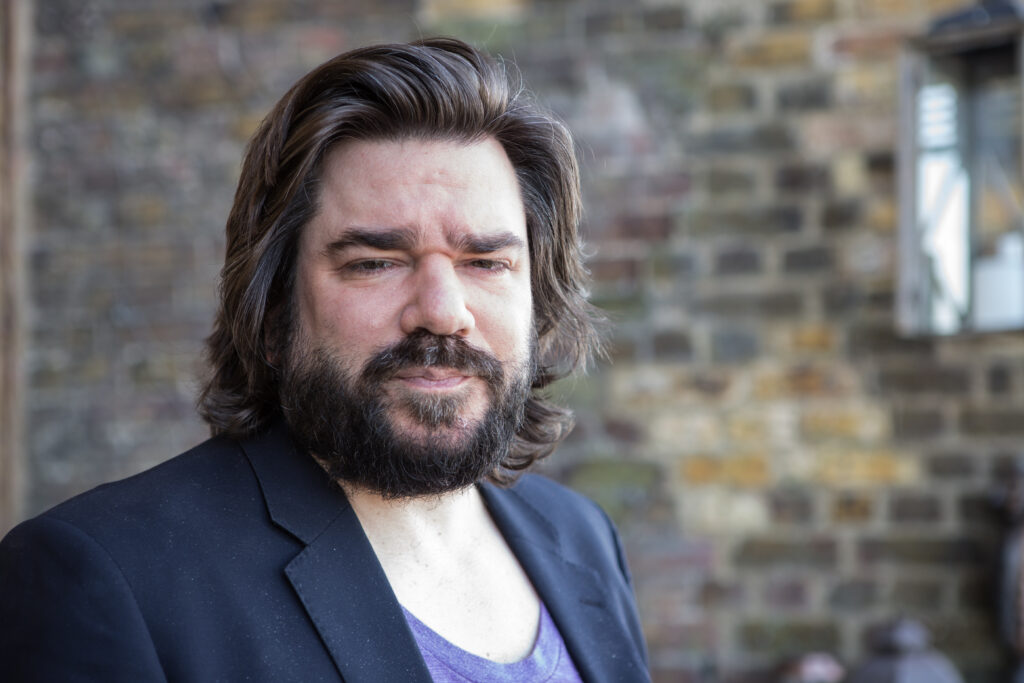
Think about The Orb playing chess or the chap from Sparks staring right down the lens – someone using a couple of minutes on telly to do something visual and artistic – and then having your grandad moan about it from their sofa. ‘Gogglebox’, you read us so well.
There’s an extra treat on Berry’s version of ‘Yellow Pearl’, because the melody is carried by Gary Numan’s signature synth, namely the Vox Humana patch on the Polymoog. It’s a notable reference to someone who would have been riding high in the charts at the time of that theme tune.
“I put that in as a nod to him,” says Berry. “Which is sort of geeky and quite unimportant, most people wouldn’t give a monkey’s, but I wanted my ‘Top Of The Pops’ cover to be lead-and-jack plug as much as possible, as if I was in 1980. So I used analogue drum machines and an arpeggiator for the bass, using their internal clocks and barely keeping time with the rest. There’s no computerised sync going on.”
Did he struggle with time keeping? The Radiophonic Workshop have complained before now about having a mare with wonky inner clocks. The instruments, that is, not the musicians.
“It’s OK if you don’t do it for too long. The Roland stuff is the most reliable: I’ve had my Roland CR-78 drum machine box for decades and that hasn’t really let me down. The old Korg ones, not so much.”
He ends his musings on ‘Top Of The Pops’ with a sobering thought – both for him and our readers. The programme may not be so important after all. At the time of interviewing him, Berry had just been recording the Planet Jarre podcast with Jean-Michel Jarre.
“I spoke to him about ‘Top Of The Pops’ and he told me it wasn’t on French TV because music wasn’t necessarily the most important art form – they had cinema instead,” says Berry. “I’d never even thought about this. I just couldn’t get my head around the fact that you wouldn’t have a ‘Top Of The Pops’. I guess it’s a very British thing.”
And so to the future. Times have changed and the modern world is crumpling our childhoods like Kenny Everett crumpled Terry Wogan’s ‘Blankety Blank’ microphone. No one sits on the sofa and watches telly like we used to. Almost all the theme tunes on Matt Berry’s album are lost to history. In this digital age, Berry faces one terrifying nemesis. It’s small and oblong and appears at the start of many of today’s TV shows.
“There’s a skip button with Netflix where you get rid of the title sequence someone spent fucking ages doing,” he says. “No one’s interested in the hundreds of crew that worked on the show: that’s being ignored. I’m not convinced that ‘Doctor Who’ would have been a hit if it didn’t have title sequences to introduce you to whoever the new Doctor was. I think ‘Lost’ might have paved the way for dispensing with title sequences, and in ‘Heroes’ they went straight into the action. That’s been happening for over a decade now. It’s enough for a younger generation to have never known them.”
‘Television Themes’ may at first appear one of the more frivolous releases in the Acid Jazz catalogue. But from its meticulous construction to its delightfully retro cover design, with a cartoon Berry sandwiched between the fourth Doctor and Zippy, the album stands as a love letter to an art form that’s under threat. It’s this concern for cataloguing an unusual period of musical creativity that Berry seems most passionate about.
“Themes are an important tool to set the vibe of a TV show,” he says. “They put you in the right kind of headspace to then deal with the actual programme. Also, with a lot of themes in the past, they’re difficult to find. Things like ‘World In Action’ and ‘Sorry!’, I just couldn’t get hold of them. It occurred to me that I’d better do a pretty good soundalike, so other people looking for recordings will get a fairly faithful rendition of these quite famous themes.”
And if our devoted readers were recording a theme tune, maybe a cacophonous jazz jingle to soundtrack Matt Berry’s many-stringed career, where would they start?
“Just focus on making a good bit of music. Don’t ever consider that it will be chopped down to 15 seconds, or that it should be used as a theme for something in particular. If it’s a good bit of music, someone will find a way to make it into a theme tune. Unless you’re being paid to produce a specific amount of seconds, then work out how it can be catchy. But it’s a lot better just to write what you consider to be decent music. And if it happens to be instrumental, then great.”
‘Television Themes’ is out on Acid Jazz
